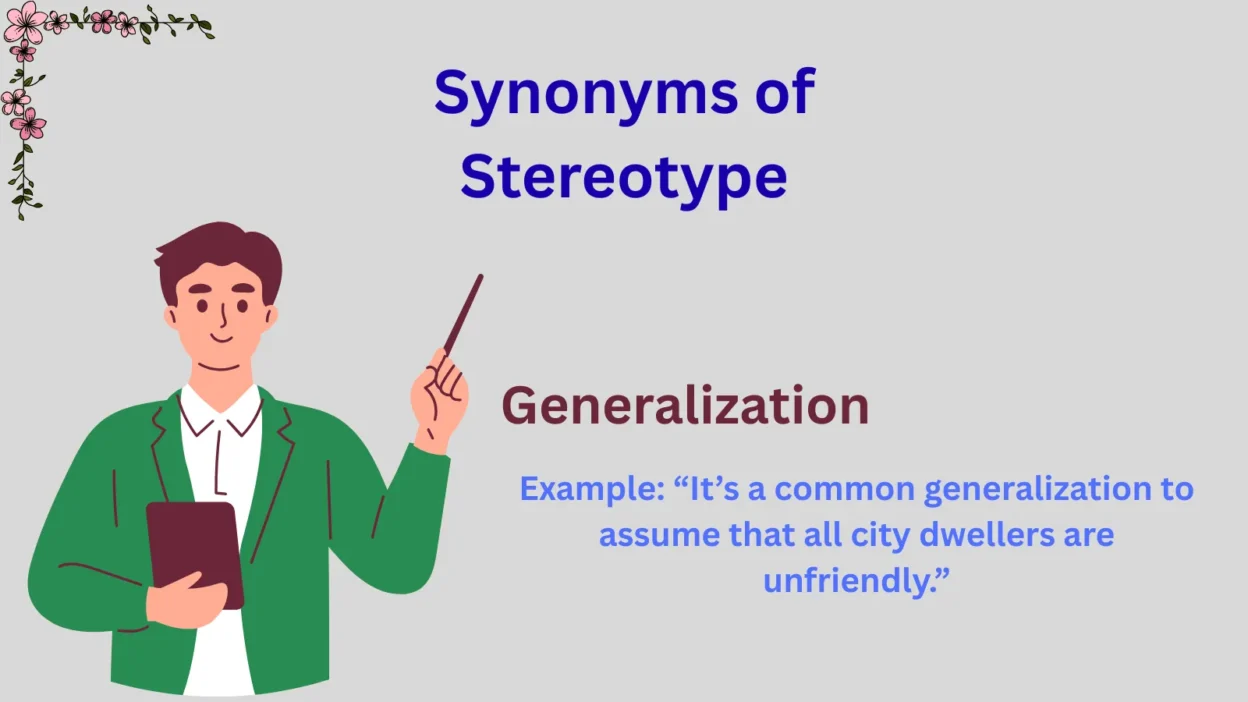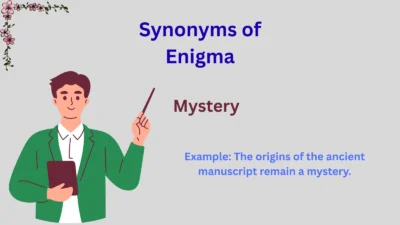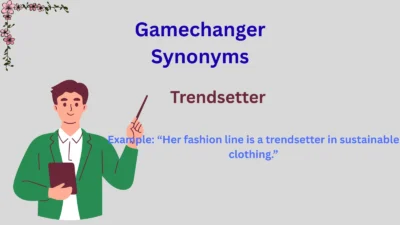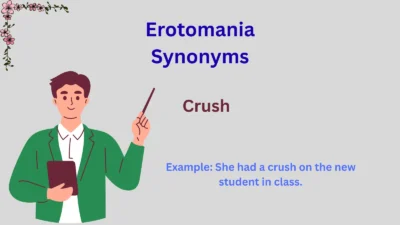Synonyms of stereotype, such as cliché, generalization, and preconception, describe fixed ideas people hold about others, often without real understanding. For example, saying “all artists are messy” is a generalization, while a cliché is a tired or overused idea, and a preconception is a belief formed before knowing the facts. These words highlight different shades of assumption and bias in how we think or speak.
If you’re writing about culture, communication, or social behavior, choosing the right synonym for stereotype helps you express ideas about judgment and perception clearly.
In this guide, you’ll learn the meaning and example sentences for each synonym of stereotype, so you can write thoughtfully about human behavior and beliefs.
Understanding the Meaning of Stereotype
A stereotype is a widely held but fixed and oversimplified idea or image of a particular type of person, group, or thing. It often involves generalizations that do not account for individual differences. For example, saying “All teenagers are lazy” is a stereotype because it paints an entire age group with a single brush.
Key nuances of stereotype include:
- Overgeneralization: It applies broadly rather than specifically.
- Social perception: Often related to cultural, racial, gender, or occupational groups.
- Emotional undertones: Can be neutral, positive, or negative, depending on the context.
Understanding these nuances helps writers choose the most precise synonym for their intended meaning and tone.
30 Synonyms of Stereotype and How to Use Them
Here is a comprehensive list of 30 synonyms, along with descriptions, examples, and context guidance:
1. Cliché
- Description: An overused phrase or idea lacking originality.
- Example: “The notion that women are bad drivers is just a cliché.”
- Usage: Best for informal or literary contexts; highlights predictability rather than prejudice.
2. Generalization
- Description: A broad statement based on limited evidence.
- Example: “It’s a common generalization to assume that all city dwellers are unfriendly.”
- Usage: Neutral tone, often used in academic or analytical writing.
3. Preconception
- Description: An idea formed before knowing the facts.
- Example: “Her preconceptions about the job were proven wrong after the first week.”
- Usage: Good for describing personal biases or expectations.
4. Label
- Description: A word or phrase applied to categorize someone or something.
- Example: “He was unfairly given the label of ‘troublemaker.’”
- Usage: Focuses on tagging or categorization, often informal.
5. Archetype
- Description: A typical example of a certain person or thing.
- Example: “The hero archetype is common in classic literature.”
- Usage: Neutral or positive tone; literary or psychological contexts.
6. Typecast
- Description: Assigning a fixed role or identity, especially in acting or perception.
- Example: “She was typecast as the villain in every movie.”
- Usage: Usually for entertainment or professional settings; can carry a slightly negative connotation.
7. Conventional wisdom
- Description: Widely accepted beliefs or opinions.
- Example: “The conventional wisdom is that breakfast is the most important meal.”
- Usage: Neutral; academic or analytical contexts; emphasizes societal agreement.
8. Prejudice
- Description: A preconceived opinion not based on reason or experience.
- Example: “Racial prejudice continues to be a challenge in many countries.”
- Usage: Strong negative tone; legal, social, or ethical discussions.
9. Bias
- Description: Inclination or prejudice for or against a person or group.
- Example: “Hiring bias can affect workplace diversity.”
- Usage: Neutral to negative; professional, social, and psychological contexts.
10. Oversimplification
- Description: Reducing complex ideas to simplistic statements.
- Example: “Saying all introverts hate parties is an oversimplification.”
- Usage: Neutral; analytical or explanatory writing.
11. Prejudgment
- Description: Forming an opinion prematurely.
- Example: “We must avoid prejudgment in evaluating candidates.”
- Usage: Neutral; formal or academic tone.
12. Generality
- Description: A statement that applies broadly without detail.
- Example: “The generality about students being lazy is misleading.”
- Usage: Neutral; formal or academic writing.
13. Norm
- Description: A standard or pattern considered typical.
- Example: “In many cultures, it is the norm to greet elders respectfully.”
- Usage: Neutral; sociological or cultural discussions.
14. Custom
- Description: Traditional behavior or practice.
- Example: “It is a custom to shake hands in formal meetings.”
- Usage: Neutral; cultural or anthropological contexts.
15. Pattern
- Description: A recurring characteristic or trend.
- Example: “A pattern emerged in the students’ study habits.”
- Usage: Neutral; analytical or observational contexts.
16. Prototype
- Description: The original model or a standard example.
- Example: “The prototype of a hero is someone who faces adversity courageously.”
- Usage: Neutral or positive; literary, creative, or technical contexts.
17. Form
- Description: Typical shape or arrangement.
- Example: “The ritual follows a specific form each year.”
- Usage: Neutral; formal or procedural contexts.
18. Standard
- Description: Widely accepted level or type.
- Example: “His behavior was outside the standard for professional conduct.”
- Usage: Neutral; formal and professional writing.
19. Convention
- Description: Accepted practice or custom.
- Example: “Following conventions can sometimes limit creativity.”
- Usage: Neutral; professional, cultural, or creative contexts.
20. Dogma
- Description: Beliefs or principles laid down authoritatively.
- Example: “He challenged the dogma that success only comes through formal education.”
- Usage: Stronger tone; often religious, philosophical, or ideological contexts.
21. Cultural trope
- Description: A recurring theme or motif in culture.
- Example: “The wise old mentor is a common cultural trope.”
- Usage: Literary, media, or cultural analysis; neutral to positive tone.
22. Prejudiced notion
- Description: A biased or unfair belief.
- Example: “The idea that teenagers are careless is a prejudiced notion.”
- Usage: Negative tone; social, psychological, or ethical contexts.
23. Schematic idea
- Description: An organized but generalized concept.
- Example: “The schematic idea of leadership often ignores diverse styles.”
- Usage: Academic or technical writing; neutral tone.
24. Idiom
- Description: An expression with a figurative meaning.
- Example: “Calling someone a ‘bookworm’ is an idiom for a studious person.”
- Usage: Neutral; literary or informal contexts.
25. Assumption
- Description: A thing accepted as true without proof.
- Example: “The assumption that men don’t cook is outdated.”
- Usage: Neutral; analytical, academic, or informal contexts.
26. Image
- Description: A mental representation of a group or concept.
- Example: “The public image of artists is often romanticized.”
- Usage: Neutral to positive; media, cultural, or social contexts.
27. Expectancy
- Description: A belief about what is likely to occur.
- Example: “Societal expectancy often pressures individuals into conformity.”
- Usage: Neutral; sociological or psychological contexts.
28. Typification
- Description: Assigning traits based on a typical example.
- Example: “Typification can simplify complex social phenomena.”
- Usage: Academic, sociological, or analytical contexts; neutral tone.
29. Mental image
- Description: A concept formed in the mind about a person or group.
- Example: “The mental image of engineers as introverted is misleading.”
- Usage: Neutral; descriptive writing.
30. Labeling
- Description: The act of assigning a name or category to someone.
- Example: “Labeling teenagers as reckless can affect their self-esteem.”
- Usage: Negative tone; psychological, social, or educational contexts.
How to Choose the Right Synonym
Selecting the right synonym depends on context, tone, and intent:
- Emotional Tone:
- Use prejudice, bias, or prejudiced notion for negative connotations.
- Use archetype, prototype, or cultural trope for neutral or positive discussions.
- Context:
- Academic: generalization, typification, schematic idea.
- Literary: cliché, archetype, idiom, trope.
- Professional/Workplace: standard, convention, label.
- Cultural Sensitivity:
- Avoid terms that may unintentionally carry judgment (e.g., stereotype, prejudgment) in formal or multicultural settings.
- Favor neutral terms like generalization, pattern, or expectancy.
- Precision:
- If emphasizing oversimplification, use oversimplification.
- If highlighting social norms, use norm, custom, or convention.
By considering these factors, you can choose a synonym that aligns perfectly with your writing purpose while maintaining clarity, respect, and nuance.
Conclusion :
Synonyms of stereotype—like cliché, generalization, and preconception—help explain how ideas can become narrow or unfair over time. Each word shows a different side of assumption: cliché points to something overused, generalization to something too broad, and preconception to a belief formed too soon.
Using these synonyms makes your writing clearer and more thoughtful. They remind us to question easy labels and look deeper at people and ideas. Understanding these words helps us communicate with fairness, empathy, and open-mindedness.



